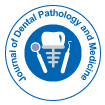Nuestro grupo organiza más de 3000 Series de conferencias Eventos cada año en EE. UU., Europa y América. Asia con el apoyo de 1.000 sociedades científicas más y publica más de 700 Acceso abierto Revistas que contienen más de 50.000 personalidades eminentes, científicos de renombre como miembros del consejo editorial.
Revistas de acceso abierto que ganan más lectores y citas
700 revistas y 15 000 000 de lectores Cada revista obtiene más de 25 000 lectores
Indexado en
- Google Académico
- ICMJE
Enlaces útiles
Revistas de acceso abierto
Comparte esta página
Abstracto
Promoción de la atención de la salud bucal para el personal de la sala de atención a personas mayores
Hanean Muhsin, Bethan Pritchard, Rakhi Sen y Stacey Clough
Introducción
Los pacientes que reciben atención en la sala de ancianos a menudo presentan antecedentes médicos complejos que resultan en un mayor riesgo de enfermedades bucales. Para mejorar la atención a los pacientes, se brindó capacitación en salud bucal al personal de la sala de geriatría del Royal London Hospital.
Objetivos
Identificar áreas que requieren mejoras en relación con la satisfacción de las necesidades de salud bucal de los pacientes de edad avanzada hospitalizados. Mejorar el conocimiento del personal sobre las condiciones de salud bucal y el mantenimiento de la misma.Métodos
Se distribuyó una encuesta a los pacientes hospitalizados para evaluar los regímenes de higiene bucal y la satisfacción de los pacientes con la atención de la salud bucal. Se realizó una encuesta en el lugar para evaluar la disponibilidad de equipos de salud bucal según las pautas de Mouth Care Matters. Se impartió capacitación al personal de la sala de atención a personas mayores sobre la asociación entre la salud bucal y la salud general, las afecciones bucales comunes y su posible impacto físico y mental. Se brindó capacitación detallada sobre la prestación de servicios de higiene bucal.
Se distribuyeron encuestas previas y posteriores a la capacitación a los asistentes para determinar los niveles de referencia de conocimientos y la eficacia de la capacitación.
Resultados
En la Tabla 1 se resume el conocimiento del personal sobre los agentes comunes que causan caries antes y después de la capacitación.
Factor
Respuestas correctas
Pre-entrenamiento (%)
Post-entrenamiento (%)
Neumonía adquirida en el hospital
75
84
Mala higiene bucal
75
84
Fruta fresca
50
84
Xerostomía
87,5
100
Azúcar
88
100
El conocimiento de la técnica de limpieza de dentaduras postizas aumentó del 75% al ??84%. La capacidad para identificar afecciones bucales comunes aumentó del 38% al 50%.
Conclusión
Los comentarios sobre la capacitación fueron positivos; el 100% de los participantes afirmó que, como resultado, cambiarían su práctica. Se ha organizado una capacitación adicional para el personal de las salas sobre cómo identificar las afecciones bucales comunes.
Revistas por tema
- Agricultura y acuicultura
- Alimentación y Nutrición
- Bioinformática y biología de sistemas
- Bioquímica
- Ciencia de los Materiales
- Ciencia general
- Ciencias Ambientales
- Ciencias Clínicas
- Ciencias farmacéuticas
- Ciencias Médicas
- Ciencias Sociales y Políticas
- Ciencias Veterinarias
- Enfermería y atención sanitaria
- Física
- Genética y biología molecular
- Geología y Ciencias de la Tierra
- Ingeniería
- Inmunología y Microbiología
- Química
Revistas clínicas y médicas
- Anestesiología
- Biología Molecular
- Cardiología
- Cirugía
- Cuidado de la salud
- Dermatología
- Diabetes y Endocrinología
- Enfermedades infecciosas
- Enfermería
- Gastroenterología
- Genética
- Inmunología
- Investigación clínica
- Medicamento
- Microbiología
- Neurología
- Odontología
- Oftalmología
- Oncología
- Pediatría
- Toxicología

 English
English  Chinese
Chinese  Russian
Russian  German
German  French
French  Japanese
Japanese  Portuguese
Portuguese  Hindi
Hindi